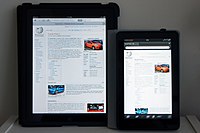
Photo from wikipedia
Abstract Tablet computers (PCs) are continuously moving towards light, thin, and small shape factors to achieve an eye appealing design while providing extreme mobility. The increased integration of electronic components… Click to show full abstract
Abstract Tablet computers (PCs) are continuously moving towards light, thin, and small shape factors to achieve an eye appealing design while providing extreme mobility. The increased integration of electronic components with high power density, smaller size, and more compact layout is leading to exceptionally high operating temperatures for tablet PCs. This research focuses on development of an inexpensive and practical solution for thermal management for tablet PCs using phase change materials (PCMs) encapsulated in thin aluminized laminated film. In this paper, the performance of the tablet PC with this PCM thermal energy storage (TES) unit under continuous operation was investigated. PT-37, a commercial PCM from PureTemp, and n-eicosane were used as PCMs, as they have been shown to be safe and relatively inexpensive, and have melting temperatures in the range suitable for thermal management of portable electronics such as tablet PCs. It was found that the insertion of the thin PCM-based TES system within that tablet PC resulted in a reduction of the rate of temperature increase, for both the electronics and the tablet cover, during the transient start-up phase of operation; leading ultimately, to lower operating temperature of the entire tablet. Findings from this research confirm that the implementation of PCM–based TES unit is a viable option for thermal management of tablet PCs.
Journal Title: International Journal of Thermal Sciences
Year Published: 2018
Link to full text (if available)
Share on Social Media: Sign Up to like & get
recommendations!